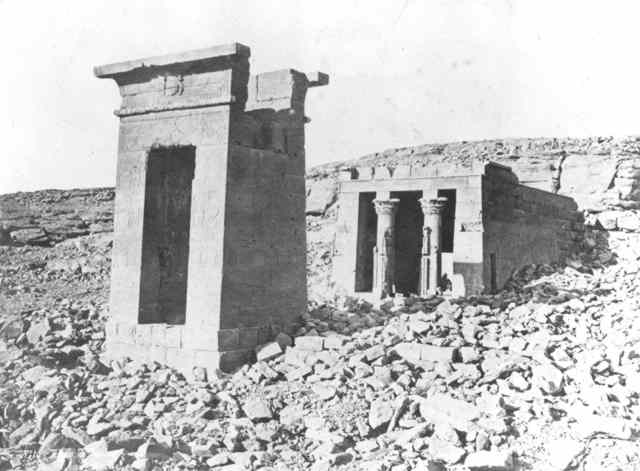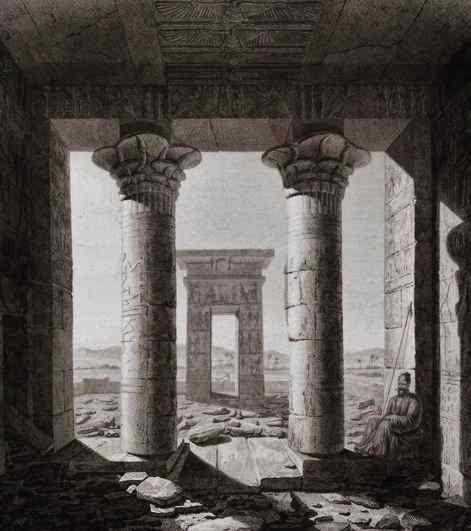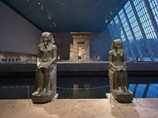AscendingPassage.com
See the: Egyptian Secrets Library.

The Wady Gharby Dendur (Dandour) Temple

Dandour by Francois Gau 1822
Dendur Temple was built about 15 B.C. by order of the Roman Emperor Augustus, considered Pharaoh of Egypt. The temple honored the goddess Isis and two "deified" sons of a local Nubian chief, Pedesi and Pihor. Interesting that the Emperor would build and dedicate a temple to Isis soon after the death of Cleopatra, the last independent ruler of Egypt, who considered herself to incarnate that goddess. The temple was flooded by the first Aswan dam in the 1900's and was rescued in the 1960's as part of the UNESCO effort spurred by the construction of the giant Aswan High Dam.
Dendur Temple was given to the United States by Egypt in 1965 in recognition of the assistance furnished by the US in the rescue of Nubian temples. The temple was placed in the Metropolitan
Museum of Art in New York City in a special building built for the purpose which opened in 1978.
Wady Gharby Dendur Temple
(Dandour, Dendoor or Dendûr.)
Excerpt from: Travels in Nubia
by John Lewis Burckhardt
Published in 1819.
March 28th, 1813.
After a ride of one hour and a
half along the narrow shore we came to Wady Gharby Dandour, or
the western Dendur. I was surprised
to meet with another ruin of a temple, as the shore is so narrow
that no city of any consequence could have been situated here. The
shore, from the foot of the rocky hills to the banks of the river
is only thirty paces in breadth.

The temple at Dendur,
by David Roberts, 1838
Before this temple stands a small propylon, or gateway, with a
high projecting cornice. Behind the
propylon is the pronaos, with two columns in front similar to
those of the temple of Dakke. The pronaos is seven paces in length.
Next follows the cella, and beyond that the adytum. There are a
few sculptures on the walls of the adytum. On those of the pronaos
I observed lotus plants in flower, as at Dakke, with persons making
offerings to them. On the exterior wall of the temple are figures
in the style of those at Tintyra, I particularly remarked a fine
figure of Horus with a finger to his lip. This temple is, in
general, extremely well built, and the
sculptures are of the best times, though I conceive it to be
later in date than the temple at Philae.

Side view of Dendur Temple,
by François Chrétien Gau, 1819
In front of the propylon,
towards the river, is a stone enclosure, thirty-five paces in
length, by fifteen in breadth. The stones with which it is
constructed are in their rough state on the outside, but smoothly
cut on the interior. The wall fronting the river is fifteen feet in
height, and describes a slight curve. The floor of this enclosure,
now covered with stones and ruins, is considerably below the level
on which the propylon and the temple are built. Had it been a place
for sacred processions? I have seen nothing like
it in any Egyptian temple. The stones and rubbish in its area
render it probable that it had originally a roof. In the rock, just
behind the temple, a small grotto is excavated.

Art from the temple at Dendûr.
by François Chrétien Gau, 1819
Four hours and a half ride from our day's begining we came to Abou
Hor. In the rock, a little to the south of this place, a reservoir
has been cut, with an outlet through which the water descends into
a lower and smaller basin. It is difficult to conceive for what
purpose they were intended, being so near the river.
Excerpt from: Travels in Nubia by John Lewis Burckhardt
Published in 1819.
NEXT CHAPTER

Dendur (Dandour) Temple, 1875
Photograph by Sebah.

Denduur Temple map,
by François Chrétien Gau, 1819

View of the propylon gateway
from inside Wadi Gharby Dendur / Dandour Temple,
by François Chrétien Gau, 1819

Dandour adytum
from the Champollion expedition, 1835.
~~~~~~~~~~~~~~~~~~~~~~~~~~~~~~~~
Dendur in New York


Dendur Temple is now located in New York City, in the Metropolitan Museum of Art. The stone enclosure between the pylon and the Nile is not in the museum and now may be underwater.
Photos from MMA.
If only the poor Egyptian shepherds
who sheltered in this ruin,
thinking only of a place
away from the cold desert night,
could see it today...

Countless beautiful 19th century images of ancient Egypt
and 75 pages of architecture, art and mystery
are linked from the library page:

The Egyptian Secrets Library















